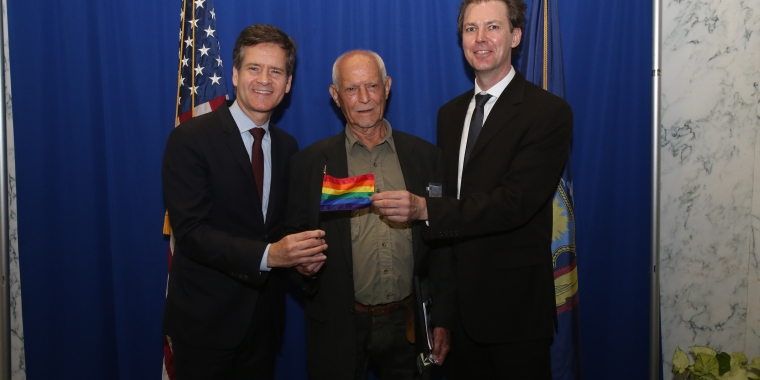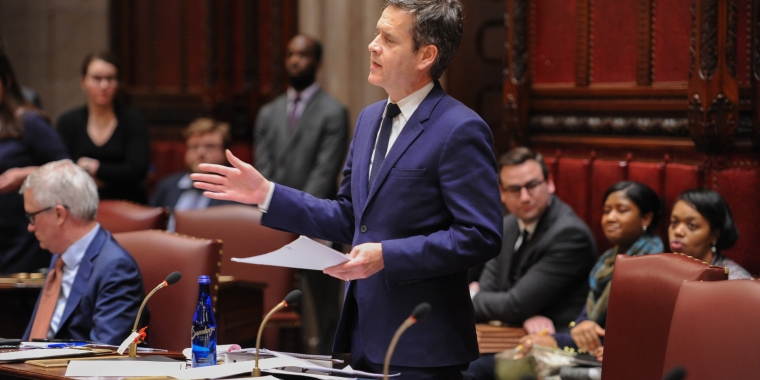
Senator Hoylman-Sigal & Assembly Member Paulin Join Michael J. Fox Foundation Calling For Passage of Legislation to Establish Parkinson’s Disease Registry
May 23, 2023
NEW YORK — Today, State Senator Brad Hoylman-Sigal, Assembly Member Amy Paulin and representatives from the Michael J. Fox Foundation (MJFF) for Parkinson’s Research called for the passage of legislation to establish a state Parkinson's Disease Registry (S4674/A5803) to provide for the collection of data on the incidence and prevalence of Parkinson’s disease (PD) and parkinsonisms. The registry will help expand understanding of PD and advance research towards prevention, treatment and an eventual cure.
A registry of people with Parkinson’s would help researchers identify high-risk groups, detect prevalence patterns among the New York population, and uncover disparities in treatment in marginalized communities. Currently, six other states, including California, already have such a registry.
State Senator Hoylman-Sigal said, “Parkinson’s disease is the second most common and fastest-growing neurological disorder in the world that impacts approximately 65,000 New Yorkers. Establishing the New York Parkinson’s Disease Registry will facilitate the collection and utilization of PD data to measure the incidence and prevalence of the disease, which will provide vital contributions towards research. I’m extremely grateful to the Michael J. Fox Foundation for Parkinson’s Research for helping us craft this important legislation and provide a ray of hope to PD patients by advancing research and innovation to better prevent, diagnose, treat and ultimately cure Parkinson’s.”
Assembly Member and Health Committee Chair Paulin said, “The more data we can give to researchers, the better they can direct their efforts to find a cure and more advanced therapies for Parkinson’s. I thank State Senator Hoylman-Sigal for his partnership and work on the Parkinson’s Disease Registry bill, and thank the Michael J. Fox Foundation for their staunch advocacy. Together we are stepping up the fight against this disease!”
Ted Thompson, MJFF Senior Vice President of Public Policy, said: “The Michael J. Fox Foundation for Parkinson’s Research has funded more than $1.75 billion in Parkinson’s research since its founding, and our priority is finding a cure. To bolster this work, researchers need a Parkinson’s registry to augment the collection of invaluable data on people living with Parkinson’s in New York State. A registry will help researchers learn more about the disease, potential environmental risks in various regions across the state and the true rates of incidence and prevalence in New York. We urge the Legislature to vote “yes” on A.5803 and S.4674 to make this critically important registry a reality.”
Barbara Zimmerman, MJFF advocate, said: “Passing this bill and creating the registry for Parkinson’s is just as important to the individuals battling Parkinson’s as it is for future generations. This bill is monumental in enabling us to understand the factors that will someday lead us to discover the root cause and hopefully a cure. My family, the approximately 65,000 New Yorkers and their families presently facing Parkinson’s disease, and the future patients will be helped by this bill.”
Dr. Gerald Benjamin, a person living with Parkinson’s, said: “It was clear from the movement of the wine in the glass that I had a tremor in my right hand. My colleague, whose retirement we were celebrating, said: ‘You better have someone look at that.’
I did. At the neurologist's office some weeks later, the doctor watched me walk down the hall and followed me into the examining room. As I turned, he said: ‘You have Parkinson's.’
More advanced tests for Parkinson’s, the second fastest-growing neurological disease in the world, are now being developed that will allow identification of its presence before symptoms manifest, facilitating earlier intervention and more effective treatment to forestall the disease's debilitating effects. There still is no cure - researchers are hard at work at this front too. But their work allows people like me who must live with the challenges created by PD every day to remain self-reliant and enjoy longer, happier, and more productive lives.
New York State is a world leader in medical research. Appropriate to this status, creation of the Registry proposed by A5803/S4674 will benefit tens of thousands of New Yorkers, and millions of others, reinforcing the capacity in our research hospitals, medical schools, and university laboratories to identify Parkinson’s in all its dimensions, scientifically describe its character and - soon I help - discover a cure.
I strongly support passage of this legislation.”
Dr. Kristi LaMonica, a person living with Parkinson’s, said: “This bill - and entire initiative - is very important for the Parkinson's community. It will allow us to get a better handle on what the affected population truly looks like. Currently, 4-20% of people with Parkinson's are said to be young onset. That is a big range! This will allow us to get a more accurate picture.”
Lia Farrington, MJFF advocate, said: “I believe that creating a registry for patients with Parkinson’s Disease will not only help to further research for a cure, but also create a community that can better support patients and their families. As someone who has had two close relatives suffering from Parkinson’s, I am in complete favor of this important bill!”
Parkinson’s disease is a progressive neurological disorder that causes unintended and uncontrollable movements and affects the lives of nearly 1 million Americans. The U.S. spends $52 billion annually on Parkinson’s treatment. This figure is expected to rise to $80 billion by 2037, and in New York alone, the direct and indirect costs to care total $3.3 billion each year. Research shows that the prevalence of Parkinson’s disease has doubled over the past 25 years, yet much remains a mystery about this currently incurable disease.
Creating a Parkinson’s registry in New York would help expand our understanding of the disease to ultimately improve the lives of those impacted. It would help identify high-risk groups, assist researchers in patterns of the disease over time, research disparities in treatment of the disease, among other benefits. California, Maryland, Nebraska, South Carolina, Utah, Washington, and West Virginia already have a statewide Parkinson’s registry.
###



